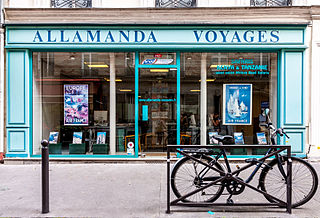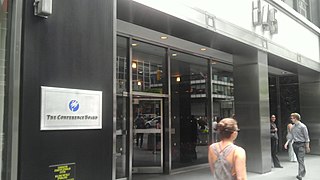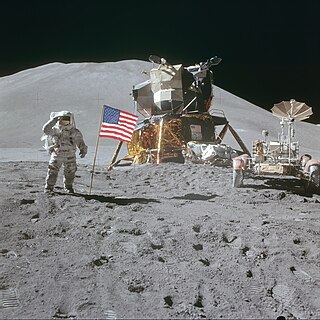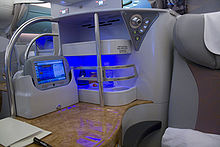Industrial and organizational psychology "focuses the lens of psychological science on a key aspect of human life, namely, their work lives. In general, the goals of I-O psychology are to better understand and optimize the effectiveness, health, and well-being of both individuals and organizations." It is an applied discipline within psychology and is an international profession. I-O psychology is also known as occupational psychology in the United Kingdom, organisational psychology in Australia and New Zealand, and work and organizational (WO) psychology throughout Europe and Brazil. Industrial, work, and organizational (IWO) psychology is the broader, more global term for the science and profession.
Human resources (HR) is the set of people who make up the workforce of an organization, business sector, industry, or economy. A narrower concept is human capital, the knowledge and skills which the individuals command. Similar terms include manpower, labor, labor-power, or personnel.

Job satisfaction, employee satisfaction or work satisfaction is a measure of workers' contentment with their job, whether they like the job or individual aspects or facets of jobs, such as nature of work or supervision. Job satisfaction can be measured in cognitive (evaluative), affective, and behavioral components. Researchers have also noted that job satisfaction measures vary in the extent to which they measure feelings about the job. or cognitions about the job.

The Welsh Government is the devolved government of Wales. The government consists of ministers and deputy ministers. It is led by the first minister, usually the leader of the largest party in the Senedd, who selects ministers and deputy ministers with the approval of the Senedd. The government is responsible for tabling policy in devolved areas for consideration by the Senedd and implementing policy that has been approved by it.

Corporate social responsibility (CSR) or corporate social impact is a form of international private business self-regulation which aims to contribute to societal goals of a philanthropic, activist, or charitable nature by engaging in, with, or supporting professional service volunteering through pro bono programs, community development, administering monetary grants to non-profit organizations for the public benefit, or to conduct ethically oriented business and investment practices. While once it was possible to describe CSR as an internal organizational policy or a corporate ethic strategy similar to what is now known today as Environmental, Social, Governance (ESG); that time has passed as various companies have pledged to go beyond that or have been mandated or incentivized by governments to have a better impact on the surrounding community. In addition, national and international standards, laws, and business models have been developed to facilitate and incentivize this phenomenon. Various organizations have used their authority to push it beyond individual or industry-wide initiatives. In contrast, it has been considered a form of corporate self-regulation for some time, over the last decade or so it has moved considerably from voluntary decisions at the level of individual organizations to mandatory schemes at regional, national, and international levels. Moreover, scholars and firms are using the term "creating shared value", an extension of corporate social responsibility, to explain ways of doing business in a socially responsible way while making profits.

A travel agency is a private retailer or public service that provides travel and tourism-related services to the general public on behalf of accommodation or travel suppliers to offer different kinds of travelling packages for each destination. Travel agencies can provide outdoor recreation, arranging logistics for luggage and medical items delivery for travellers upon request, public transport timetables, car rentals, and bureau de change services. Travel agencies can also serve as general sales agents for airlines that do not have offices in a specific region. A travel agency's main function is to act as an agent, selling travel products and services on behalf of a supplier. They are also called Travel Advisors. They do not keep inventory in-hand unless they have pre-booked hotel rooms or cabins on a cruise ship for a group travel event such as a wedding, honeymoon, or other group event.
Flextime is a flexible hours schedule that allows workers to alter their workday and decide/adjust their start and finish times. In contrast to traditional work arrangements that require employees to work a standard 9 a.m. to 5 p.m. day, Flextime typically involves a "core" period of the day during which employees are required to be at work, and a "bandwidth" period within which all required hours must be worked. The working day outside of the core period is "flexible time", in which employees can choose when they work, subject to achieving total daily, weekly or monthly hours within the bandwidth period set by employers, and subject to the necessary work being done. The total working time required of employees on Flextime schedules is the same as that required under traditional work schedules.
Organisational climate is a concept that has academic meaning in the fields of organisational behaviour and I/O psychology as well as practical meaning in the business world There is continued scholarly debate about the exact definition of organisational climate for the purposes of scientific study. The definition developed by Lawrence R. James (1943-2014) and his colleagues makes a distinction between psychological and organisational climate.
"Psychological climate is defined as the individual employee’s perception of the psychological impact of the work environment on his or her own well-being. When employees in a particular work unit agree on their perceptions of the impact of their work environment, their shared perceptions can be aggregated to describe their organisational climate ."
An employee handbook, sometimes also known as an employee manual, staff handbook, or company policy manual, is a book given to employees by an employer.

Sustainable tourism is a concept that covers the complete tourism experience, including concern for economic, social, and environmental issues as well as attention to improving tourists' experiences and addressing the needs of host communities. Sustainable tourism should embrace concerns for environmental protection, social equity, and the quality of life, cultural diversity, and a dynamic, viable economy delivering jobs and prosperity for all. It has its roots in sustainable development and there can be some confusion as to what "sustainable tourism" means. There is now broad consensus that tourism should be sustainable. In fact, all forms of tourism have the potential to be sustainable if planned, developed and managed properly. Tourist development organizations are promoting sustainable tourism practices in order to mitigate negative effects caused by the growing impact of tourism, for example its environmental impacts.
Workplace bullying is a persistent pattern of mistreatment from others in the workplace that causes either physical or emotional harm. It can include such tactics as verbal, nonverbal, psychological, and physical abuse, as well as humiliation. This type of workplace aggression is particularly difficult because, unlike the typical school bully, workplace bullies often operate within the established rules and policies of their organization and their society. In the majority of cases, bullying in the workplace is reported as having been done by someone who has authority over the victim. However, bullies can also be peers, and subordinates. When subordinates participate in bullying this phenomenon is known as upwards bullying. The least visible segment of workplace bullying involves upwards bullying where bullying tactics are manipulated and applied against “the boss,” usually for strategically designed outcomes.

The Conference Board, Inc. is a 501(c)(3) non-profit business membership and research group organization. It counts over 1,000 public and private corporations and other organizations as members, encompassing 60 countries.

Employee engagement is a fundamental concept in the effort to understand and describe, both qualitatively and quantitatively, the nature of the relationship between an organization and its employees. An "engaged employee" is defined as one who is fully absorbed by and enthusiastic about their work and so takes positive action to further the organization's reputation and interests. An engaged employee has a positive attitude towards the organization and its values. In contrast, a disengaged employee may range from someone doing the bare minimum at work, up to an employee who is actively damaging the company's work output and reputation.

The industry which has a range of businesses that deal with money like banks, insurance companies, accounting companies, finance companies, taxation, investment funds, credit companies, and few government enterprises is called the finance industry. The activities or services within this industry that cater to the economy of the country are called financial services. Therefore, the economic services provided by the finance industry in Japan are called financial services in Japan. These services are present across the world, at regional, international and national level developed economic and demographic regions such as Sydney, New York, London, Tokyo, etc.
Corporate travel management is the function of managing a company’s strategic approach to travel, the negotiations with all vendors, day-to-day operation of the corporate travel program, traveler safety and security, credit-card management and travel and expenses ('T&E') data management.
Bring your own device —also called bring your own technology (BYOT), bring your own phone (BYOP), and bring your own personal computer (BYOPC)—refers to being allowed to use one's personally owned device, rather than being required to use an officially provided device.
Information culture is closely linked with information technology, information systems, and the digital world. It is difficult to give one definition of information culture, and many approaches exist.
Tourism impacts tourist destinations in both positive and negative ways, encompassing economic, political, socio-cultural, environmental, and psychological dimensions.

During the COVID-19 pandemic, many countries and regions imposed quarantines, entry bans, or other travel restrictions for citizens of or recent travelers to the most affected areas. Some countries and regions imposed global restrictions that apply to all foreign countries and territories, or prevent their own citizens from travelling overseas.
Psychosocial safety climate (PSC) is a term used in organisational psychology that refers to the shared belief held by workers that their psychological health and safety is protected and supported by senior management. PSC builds on other work stress theories and concerns the corporate climate for worker psychological health and safety. Studies have found that a favourable PSC is associated with low rates of absenteeism and high productivity, while a poor climate is linked to high levels of workplace stress and job dissatisfaction. PSC can be promoted by organisational practices, policies and procedures that prioritise the psychosocial safety and wellbeing of workers. The theory has implications for the design of workplaces for the best possible outcomes for both workers and management.









